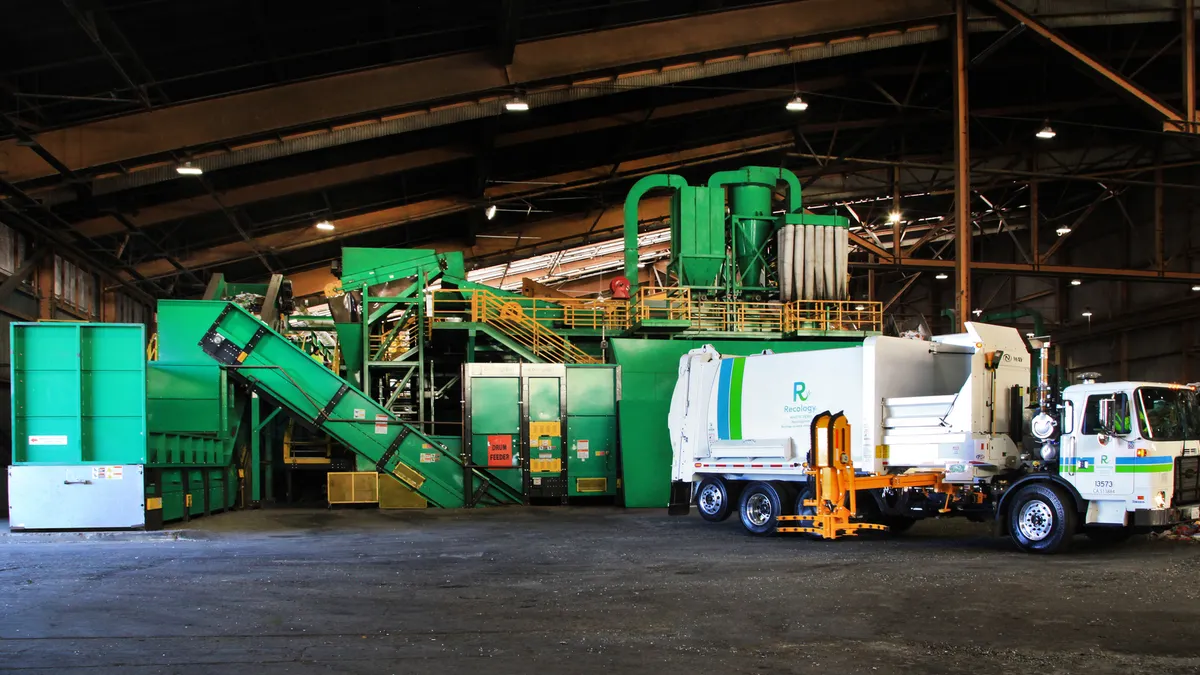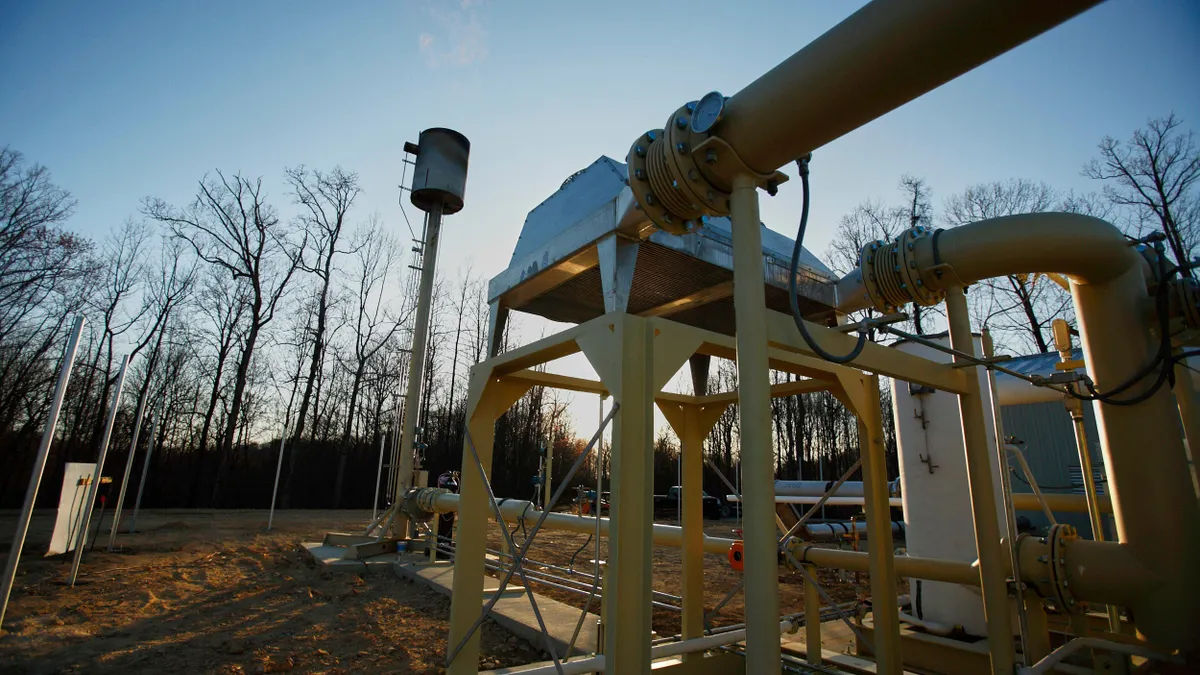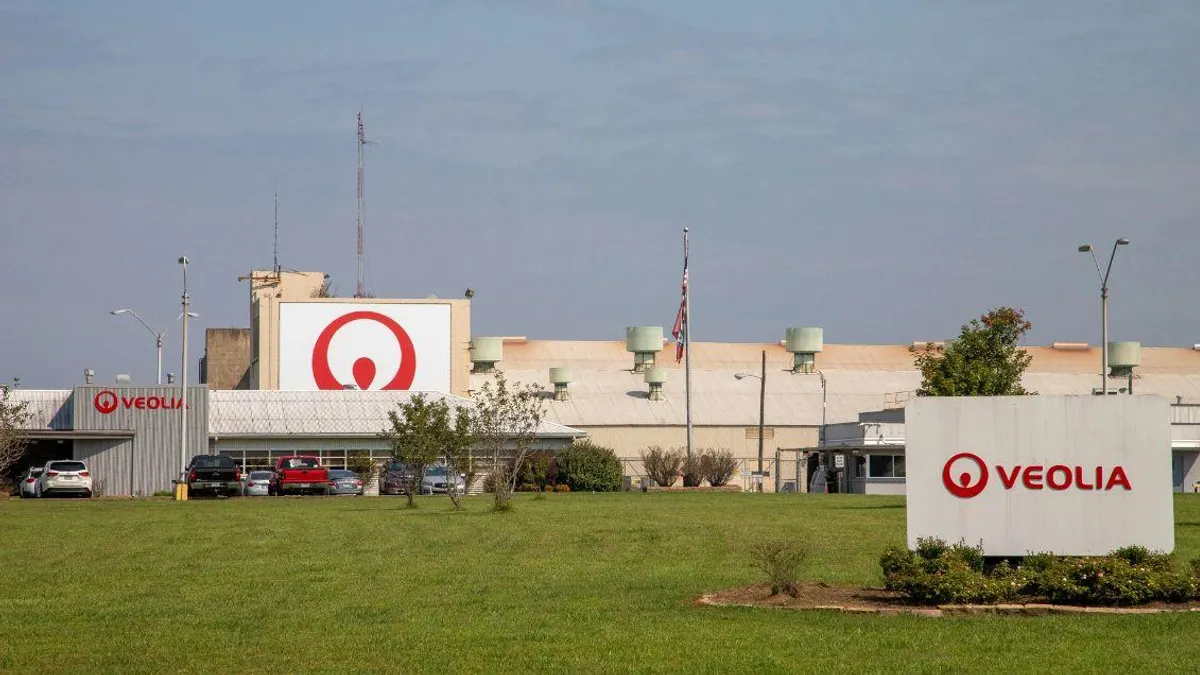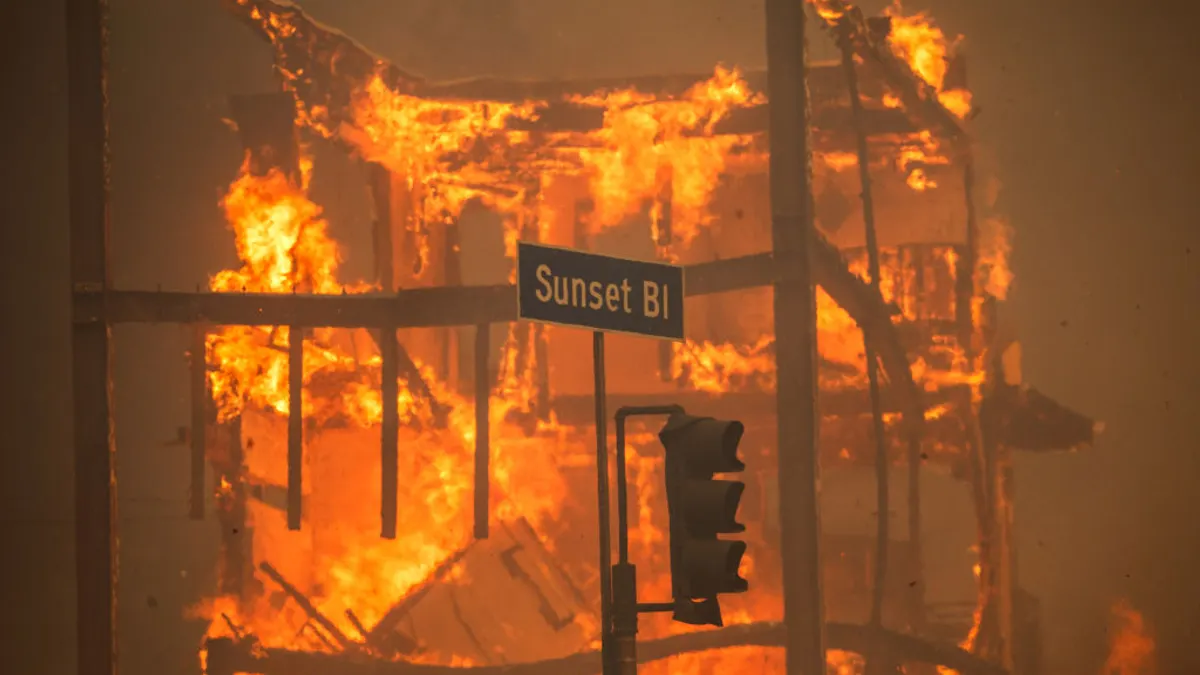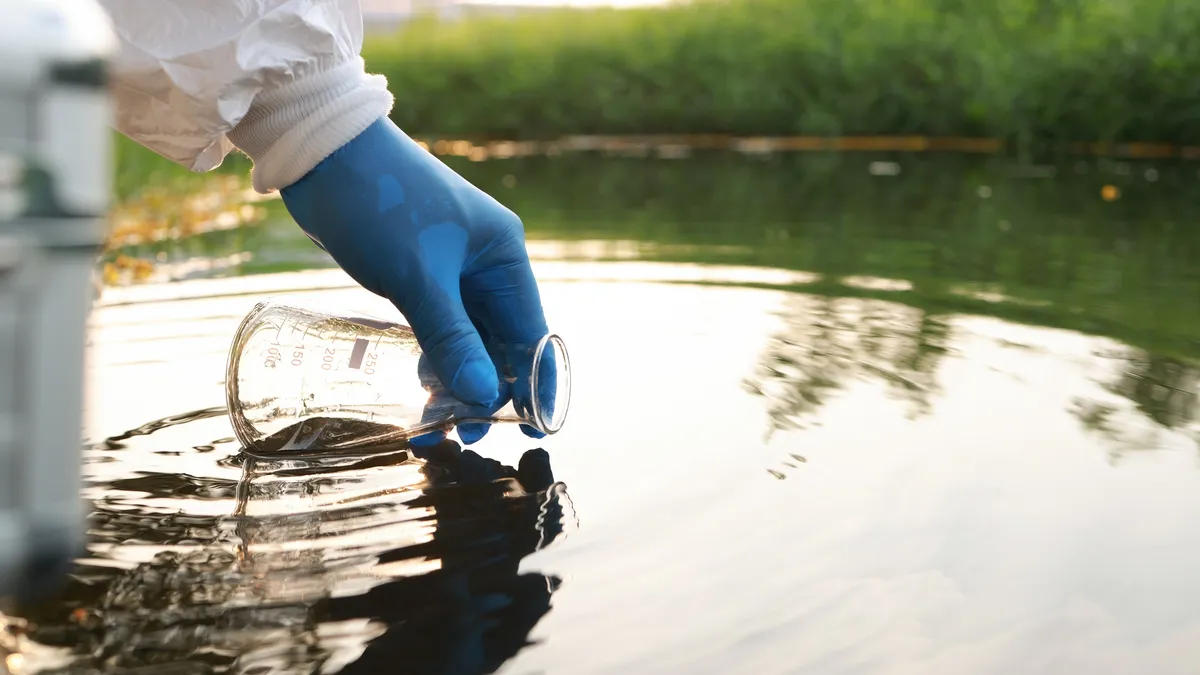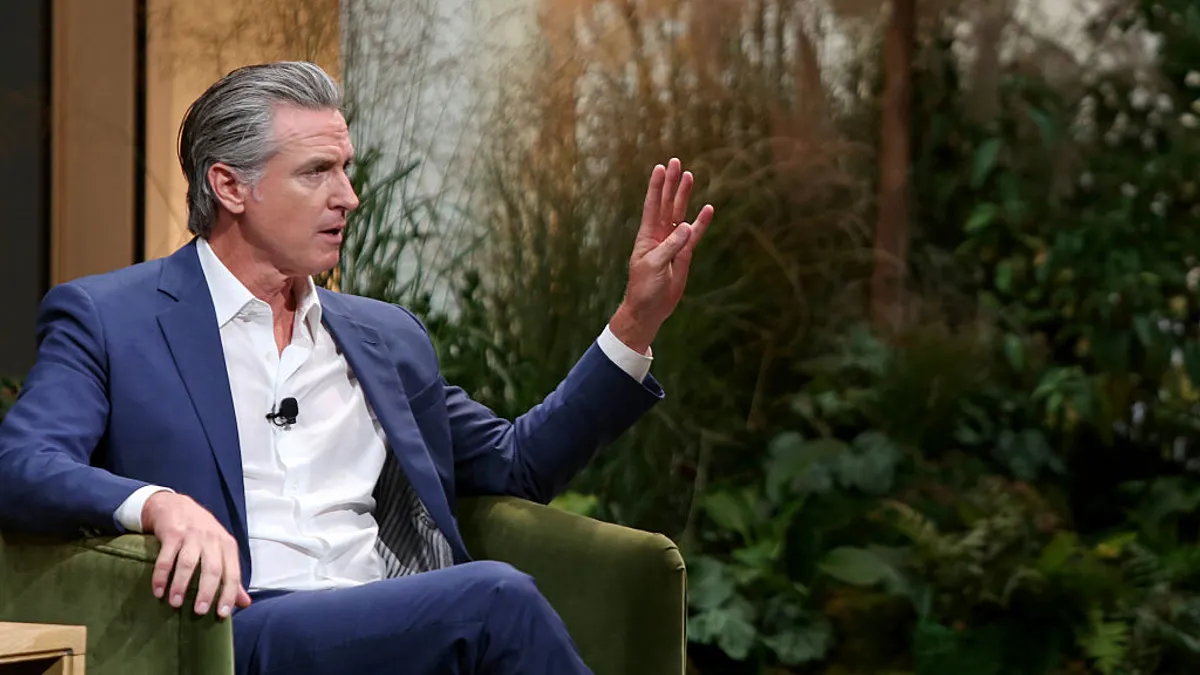Recology, one of the industry's oldest large-scale operators, recently saw a change in senior leadership amid an especially challenging year.
In July, 21-year industry veteran Sal Coniglio was promoted to executive vice president and COO. Coniglio joined Recology in 2015, after working for other companies on the West Coast, and most recently served as a regional manager. He described the COO job as a "natural fit" given an interest in engaging with employees and customers, and experienced an especially trying first few months in the new role with ongoing pandemic effects and major wildfires.
Not only did the pandemic disrupt Recology's plans for a 100-year anniversary parade, it also delayed a high-profile plastics ballot initiative into 2022 and affected multiple lines of business. At the same time, Recology continued with investments at its San Francisco C&D operation, along with retrofitted and new organics processing facilities in multiple states.
Waste Dive spoke with Coniglio in October. The following conversation has been edited.
WASTE DIVE: Obviously, it's been a hard year for many reasons – COVID, heavy wildfire season and more. How are the employees holding up?
SAL CONIGLIO: We operate primarily on the West Coast and we actually have business in King County, Washington, outside of Seattle, where the first COVID cases broke.
It's definitely challenging times for everybody. A lot of folks are scared [about] what's going on in general. But then, being essential employees, we have a lot of employees that are proud to come to work every day and continue to support the waste industry and support their communities and getting everything picked up. I think we're extremely proud that in our service cities we haven't had much disruption in waste collection and recycling collection throughout this process.
In general, it's been challenging, not just for us, but for every worker in the United States at this point.
Has Recology's employee ownership structure been helpful or challenging in terms of dealing with COVID, as far as having a more resilient culture or affecting the ability to adjust hours?
CONIGLIO: We internalize a lot of our tons at our landfills and compost operations and MRFs. And so tonnages being down, and tonnages having shifted, you've had to shift the workforce. But the employee ownership culture, in my opinion, makes it easier ... It's unlike any place that I've worked for before, where people want to do what's best for the organization and they step up in these challenging times.
We've seen it in multiple occasions. If we had a new company, and we needed a bunch of employees to travel to a different location for a startup, a lot of employees will raise their hand and show up on their own time to give back to the company to help the company succeed. So we're seeing it in this situation as well.
What's a good way to think about the current state of the West Coast market? I know some of the shutdowns happened earliest out there and business has still not come back everywhere. In my mind, California was alongside New York City as one of the hardest hit areas economically for the industry. Is that fair to say?
CONIGLIO: Yeah, it's fair to say. There's definitely a drop in commercial business and a rise in residential volumes. I think that's pretty consistent across the U.S., but on the West Coast it's definitely [the case] here. And we service some areas that rely on tourism. So there's definitely that drop in commercial business. And it all changes based on location, urban versus rural, and we have a pretty good mix of that.
We have some rural areas in California that didn't shut down too much, but they don't really rely on public transit, they don't really rely on tourism. It's more [agricultural] land, where a lot of operations haven't really slowed down because they couldn't. So the rural areas weren't that impacted, but there were some impacts. That's very different than San Francisco and Seattle, where there were.
Have you encountered financial concerns among local governments or other customers?
CONIGLIO: We kind of worked with each city and municipality that we service ... There were some areas where we did give some customers relief on paying their bill and extending the terms. But for the most part, we were able to work with that case by case.
There were some communications early on from some of the local haulers that were looking for some type of recovery from the state [of California], but we didn't really engage in that too aggressively. I know that some of our competitors were landfilling recyclables during the COVID shelter-in-place. We didn't engage in any of that as well. It was pretty much business as usual, and very little interruption of service on that end of the business.
So it sounds like from a financial standpoint Recology is holding up. Looking ahead, do you have any concerns about budget shortfalls among local government customers or other issues?
CONIGLIO: Recology is holding up. We did okay. A lot of our non-union employees, and particularly management, took voluntary unpaid time off so we could make sure that we weren't laying off employees ... It kind of goes hand in hand with the employee ownership culture. So a lot of us essentially took pay cuts in management and the administrative level to protect others, because we didn't know what was going to happen with COVID. [We saw] a significant shortfall in revenue, but we were able to do what we can to get through.
The construction and C&D market was pretty booming on the West Coast, especially in California. And just now we're starting to see that slow down. So I don't know if those projects pre-COVID were already set in place and now they're just starting to end. There's not a lot of new projects coming online. But for the most part, a lot of those small businesses and restaurants are struggling. And we've seen a lot of them reduce service. That's pretty standard across the U.S. right now.
Is that temporary reduction in hours ongoing?
CONIGLIO: We just ended that at the end of September. So from March to the end of September, we had a voluntary program and some people took advantage of that. It helped make sure that we were going to stay profitable, and help save us from having to do mass layoffs.
It seems the wildfire season has been particularly challenging this year. Has that affected your operations in any notable way?
CONIGLIO: Yeah, we have quite a bit of our business in Northern California and the Southern Oregon area. We service Butte County, which seems to be particularly hit with wildfires pretty consistently year over year. And then we also service the city of Talent [which had a major fire in September]. It was very, very disruptive to our operation in a way that we were having to sometimes relocate trucks in yards away from the path of the fire. We also had some fires in Sonoma and Vacaville as well, all Northern California cities.
So we've gotten pretty good at it, it's not new for us ... I think we've had three employees lose homes this year, which is unfortunate, but it seems to be kind of the norm for us. It's something that we've been dealing with for the last four or five years, and it just became worse and worse.
Since you're overseeing safety, what do these events mean in terms of higher risk for workers being exposed to extreme heat or poor air quality?
CONIGLIO: So we're always keeping an eye on air quality, to make sure it's safe for our workers and that's our priority. But what you find in situations where we still need to get the materials picked up during these wildfire times, what will end up happening is you have a lot evacuations ... So even though there's poor air quality, we need to collect material from shelters, find a way to still take care of the community's needs. So that's something that we watch very closely ... It's extremely challenging and it's something that we keep an eye on.
Last year, there were significant wildfires all across the state of California. And there was kind of a [scarcity of N95 masks]. So as a company we learned we need to have a strong supply of N95s to deal with wildfires going forward. When COVID hit we had a significant inventory of N95s when other companies did not, because that's part of our wildfire air quality plan.
So in terms of safety, during a wildfire season that's what we're always taking a look at. How is this going to affect our employees with air quality, and just making sure that they're not in danger of being trapped in a fire on their route. So it's something we're talking a lot about because that seems to be the norm, especially the areas that we service.
Organics recycling has been a big focus in your market area for years now. In other regions, it's common to hear from companies that the service can't often compete with low disposal tip fees without a regulatory driver. Clearly in California you have current and upcoming regulatory drivers. But do you buy that's the only way to make this work, that it has to be cost competitive to disposal, or are there other factors?
CONIGLIO: It definitely helps, because there is a higher cost than putting those materials in the landfill. But it also is the right thing to do to, to get it to compost, to put that compost application back into the soils. We've made some significant capital investments in our compost operations here, in Oregon and in California on the pre-processing side and the processing side. But I do think legislation is the biggest driver. Because it's definitely a lot cheaper to send that to the landfill. But that's also not good for the environment. So you have kind of a social responsibility piece, as a leader in this industry, that we have to think about. So, legislation is probably the biggest driver to that, but sometimes we need to do what's right and kind of hope legislation catches up.
There is currently still a need for some disposal and you own or operate three landfills. What are the company's goals for the future of those landfills, as costs to manage landfills are rising?
CONIGLIO: The landfills that we operate are here in California. So we're seeing more diversion and less materials go into those landfills. So it looks like landfills here are a dying breed over time, and there's quite a bit of landfill capacity here on the West Coast as well. So tipping fees on the West Coast are fairly low in comparison to what it takes to compost. For us, we've always been a very different company and progressive when it comes to recycling and the environment, so we're going to continue to divert from the landfill the best we can. That's what a lot of our customers want. And that's what we want.
It's kind of interesting, because of where our landfills are located it's almost turned into like mutual aid devices in terms of handling fire debris, because the fire debris needs to go somewhere. So we've been in some pretty fortunate positions where we've been able to help provide a solution for these communities to rebuild, because they have a location to take their fire debris. So I hope that our landfills don't turn into landfills that only take fire debris, and fire debris isn't a common theme around here. But I think what we're doing here in the West Coast is we're doing it right, where we have legislation and we have communities that support diverting from the landfill to reduce methane from these sites.
Is there anything else you want to call out as part of the company's 2023 plan that people should be watching for?
CONIGLIO: We're always looking to grow, where it makes sense for us to grow ... The ultimate goal is you're providing your workers, not Wall Street. We think that employee ownership culture goes a long way, when you're reinvesting in the communities that you serve. So we're always looking to grow in those communities that support the employee ownership model, and also those that are environmentally aware and want a company like us that can help achieve those environmental goals.
Could there be more M&A in the company's future?
CONIGLIO: Yeah, we're always looking. We don't have anything specifically in the pipeline at the moment, but we're always looking to grow. That's always a possibility for us.
Should we think about you staying in the same general region in any future expansion?
CONIGLIO: Yeah, for the most part in the general region. We're always looking to expand to other states. We never turn down an opportunity to explore, but generally we're a West Coast company. We've been very successful on the West Coast, and especially in the franchise market, in markets that are focused on diverting waste from the landfills. [And] while we're always still looking to grow outside of our current footprint, we're still making an effort to invest within our current footprint in our operations to make them better, and achieve higher recovery.


